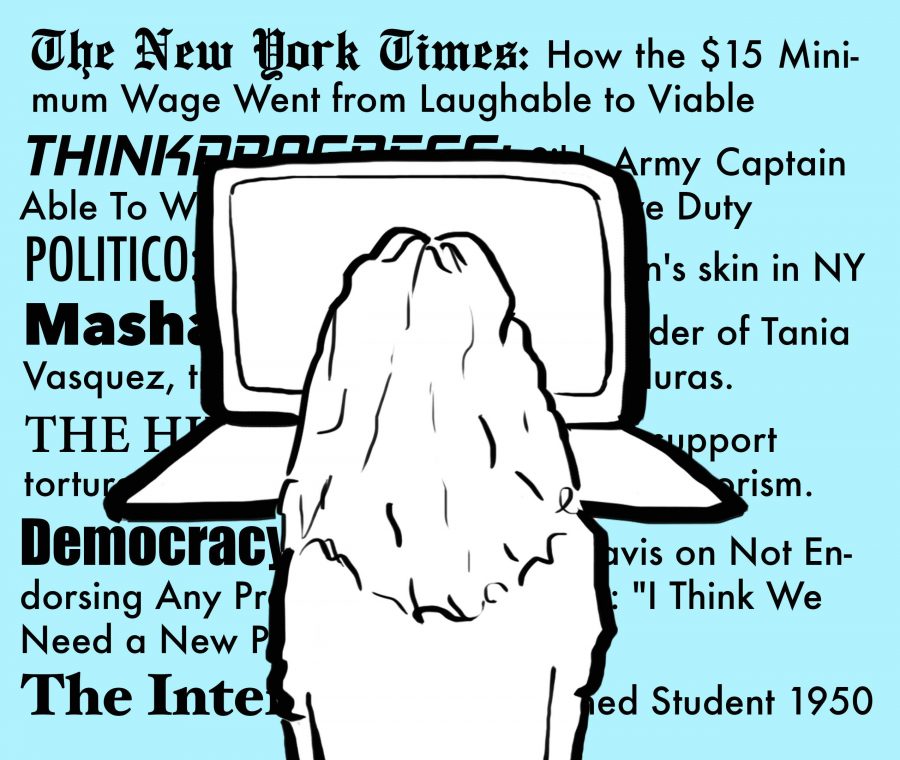Originally published in the April issue of El Estoque.
As we scroll through Facebook, we see tutorials and group photos and embarrassing statuses that remind us of how much we’ve changed in the past few years. But recently, we’ve seen something else emerge on teen social media circles, aggressively and in full force: politics. In fact, in a survey of 219 MVHS students, 50 percent see social media posts endorsing a presidential candidate every day. Getting our news and perspectives from social media is a relatively new status quo, and as sites become more curatable, it’s easier to see only one type of news. How we see issues, such as our views on presidential candidates, is highly influenced by our feeds, which we determine by the pages we “like” and the people we follow or friend. Opinionated pieces in social media can put us in someone else’s shoes, but they can also neglect context and the objective truth.
Social media sites are evolving, and with them, the way we get information. In January, Facebook launched a trending topics sidebar with news stories. And in October of last year, Twitter created “Moments”, a way to skim aggregated tweets about one topic. Our news is getting easier to digest and easier to share.
Using platforms like Facebook and Twitter to repost articles, debate in comment sections and keep up with the news is becoming increasingly common at MVHS. Thirty-nine percent of 212 MVHS respondents use Facebook to keep up with the news. Put simply, it’s a good thing. Most teachers would be ecstatic that we think critically and discuss beyond the classroom.

Although our social media circles serve as platforms to shed light on a wide range of issues, this year’s presidential election is most prevalent. We have Republicans on campus, but at MVHS, the real debate seems to be whether to vote for Hillary Clinton or Bernie Sanders on June 7, the day of California’s Democratic primary.
The debate is most visible with the senior class. As they approach voting age and take the required semester of Government, it’s not just the political junkies that champion the discussion. Seniors of all academic interests are involved. Some choose to share the occasional article — usually criticizing a candidate’s voting history or the viability of their plans — while others are more hardcore, providing analysis, arguing in debates and advocating for their candidates at all costs, at least online.
This online form of political participation is crucial. In a country where voter turnout for eligible 18-24 year-olds is around 25 percent, it’s critical that young voters educate themselves on how, why and who to vote for, and most importantly, how it will affect them.
But we must have this discussion the right way. Sharing articles and videos is great, but leaving out context ultimately misinforms voters. The ways in which we do this are countless. We do this by criticizing Hillary for advocating for the 1994 Crime Bill, without mentioning that a majority of black legislators and Bernie Sanders also voted for it. We do this by bringing up Bernie Sanders’ more moderate approach on gun control, without asking why he isn’t as liberal on guns as on other issues.
This isn’t entirely our fault. Many of the news sources we share purposefully leave out context. When Facebook started auto-playing videos on our newsfeeds, online journalism evolved. News videos with highlighter-color texts, like AJ+ and NowThis, became common, landing spots among the most viewed video publishers on Facebook. But both AJ+ and NowThis are unapologetically biased publishers: they’re liberal propagandists that should be classified as advocacy journalism.
Many sites, such as Facebook, have developed algorithms which optimize our feeds to show us more of what we like and less of what we don’t.
This wouldn’t be much of an issue if what we follow on social media platforms wasn’t so curatable. We tend to follow, read and share perspectives that interest us, and social media websites are catching onto this. Many sites, such as Facebook, have developed algorithms which optimize our feeds to show us more of what we like and less of what we don’t. Online platforms can and should be used to expose ourselves to a wide variety of perspectives. In the context of this year’s election, that means going beyond your circle of friends who might support the same candidate as you do. Is getting off of Facebook the answer? Probably not. Social media has become the dominant force of change in our lives and in the world, from regime-toppling revolutions to a platform that has normalized coming out of the closet. But it’s our responsibility to not let it give us tunnel vision.








